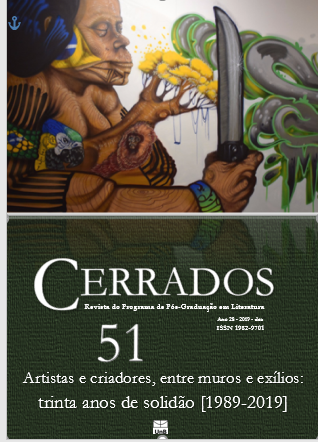HAITIAN LAUGHTER
LAUGHS AND SONGS IN COMPÈRE GÉNÉRAL SOLEIL BY JACQUES-STÉPHEN ALEXIS
Keywords:
Laughter and songs. Compère Général Soleil. Transtextuality. 20th century Haitian literatureAbstract
This article deals with the representation of laughter and songs, which appear as the identity trait of the being-Haitian in Jacques-Stéphen Alexis' novel Compère Général Soleil (1955).To this end, this work is constructed as a critical examination designed to analyze some extracts in this narrative that maintains relations of intertextuality with the definition of being-Haitian: "a people who sings and suffers, who pains and laughs, who sings incessantly ... "formulated by Jean Price-Mars in Ainsi parla l’oncle (1928). Critical examination of the said book, from the figuration of laughter and songs, is an opportunity to observe how the author traces a touchstone of his idea.
References
_____________________. Prolégomènes à un manifeste du réalisme merveilleux des Haïtiens.Comentário: Maximilien Laroche (Universidade Laval). [Présence Africaine, 1956]. Dérives. Montréal, n.12, 1970. p. 245-271.
_______________________. Où va le roman? [Présence Africaine, 1957]. In. GILLEROT, Dominique et all. Intersections: Jacques Stéphen Alexis. Bruxelles: Coopération par l’éducation et la Culture (CEC), 2013, p. 71-87.
BOADAS, Aura Marina. Lo barraco en la obra de Jacques Stephen Alexis. Caracas: Centro de Estudos Latinoamericanos; Fundación Celarg, 1990, p. 5-99.
BÉCHACQ, Dimitri. Les parcours du marronnage dans l’histoire haïtienne: Entre instrumentalisation politique et réinterprétation sociale. Ethnologies. Vol. 28, n° 1, p. 203-240. Disponible aux: <http://id.erudit.org/iderudit/014155ar>. Consulté le 20/12/2017.
BERGSON, Henri. Le rire: Essai sur la signification du comique. Paris: Presses Universitaires de Frances, 1940.
CHARLES, JUDITH. L’indigénisme dans le roman haïtien. (Mémoire de Maitrise en Lettres) Faculté des Études Pós-Graduées ”“ Université McGill,1984, 166f.
CORDIER, Adeline. Le rire dans la chanson française: facette populaire d’une exception française? In. DUNCAN, Alastair B.; CHAMAYOU, Anne Chamayou (dir.). Le rire européen. Perpignan: Presses universitaires de Perpignan, 2010, p.145-158.
DALEMBERT, Louis-Phillipe; TROUILLOT, Lyonel. Haïti: une traversée littéraire. Paris: Cultures frances/Éditions Philippe Rey, 2010 / Port-au-Prince: Presses nationales d’Haiti, 2010. p. 24-25.
HILARION HILARIUS. In. Dictionnaire Lexilogos Latin graffiot. 1934, p.746-748. Disponible aux: <https://www.lexilogos.com/latin/gaffiot.php?q=Hilarius>. Consulté le 12/07/2019.
KONGOLO, Tshitungu Antoine. Préface: Le conte comme méthologie de liberté. VÉTÉ-CONGOLO, Hanéta. L’intéroralité caraïbénne: le mot conté de l’identité, vers une esthétique caraïbénne. Saint-Denis: Connaissances et Savoirs, 2016, p. 11-14.
LAROCHE, Maximilien. La double scène de la représentation: oraliture et littérature de la Caraïbe. Québec: Grelca, collection Essai, no.08, 1991.
MUDIMBE-BOYI, M. Elisabeth. L’oeuvre romanesque de Jacques-Stephen Alexis: Une écriture poétique, un engagement politique. Montréal: Humanitas nouvelle optique, 1992.
PIERRE Schallum. Le Réalisme Merveilleux de Jacques Stephen Alexis: esthétique, éthique et pensée critique. (Doctorat, en Philosophie). Université Laval: Québec, 2013, p.345f.
PRICE-MARS, Jean. Ainsi Parla l’Oncle: Essais d’Ethnographie. New-York: Parapsycology foundation, Inc., 1928.
___________________. Formation ethnique, folk-lore et culture du peuple haïtien. 2a. Éd. Port-au-Prince, Haïti: Imprimerie N.A. Theodore, 1956.
VÉTÉ-CONGOLO, Hanéta. L’intéroralité caraïbénne: le mot conté de l’identité, vers une esthétique caraïbénne. Saint-Denis: Connaissances et Savoirs, 2016.
Downloads
Published
Issue
Section
License
Copyright (c) 2020 Revista Cerrados

This work is licensed under a Creative Commons Attribution 4.0 International License.
Proibida a reprodução parcial ou integral desta obra, por qualquer meio eletrônico, mecânico, inclusive por processo xerográfico, sem permissão expressa do editor (Lei n. 9.610 de 19/2/1998 )



